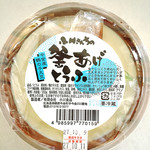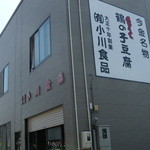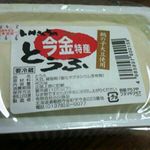
小川食品
Ogawashokuhin
3.05
Hiyama, Oshamambe Area
「Other」
--
--
Opening hours: 8:00-17:00
Rest time: Sundays Business hours and holidays are subject to change, so please check with the store before visiting.
北海道瀬棚郡今金町今金223
Photos
(18)


















Details
Comments
(8)
かつろ
4.00
This is a tofu shop located in Imakane Town in southern Hokkaido. The shop was established in 1921, making it a well-established store with over 90 years of history. They are known for their tofu made from locally grown "Tsurunoko" soybeans, which are known for their sweetness and rich flavor. I have been a fan of this shop for a while and whenever I pass by, I try to get some freshly made tofu. Their products are also available in large supermarkets in Sapporo and antenna shops, making it more accessible. One of their popular products is the "Ogawa-san's Tsurunoko Tofu," which has a natural sweetness and rich soybean flavor. Another favorite of mine is the "Yose Tofu," which has a fluffy texture and a strong soybean flavor. They also offer the "Oyako Tofu," which is topped with tofu and boiled soybeans, adding an interesting texture to the dish. I look forward to continuing to enjoy their delicious tofu products in the future. Thank you for the meal.




めえめえめえ
4.00
In August 2014, when I visited Imakane, I made sure to stop by Ogawa's factory. A man in a tofu shop look, wearing an apron and rubber boots, greeted me. He kindly sealed the tofu packs that had nothing on them. It felt luxurious to think that they were shipped out just like that from the factory. When I tried the tofu, it was indeed cottony but not too firm. I prioritized the taste of the soybeans, so I didn't mind the firmness. My husband bought it for me from the A-Coop in Imakane in May 2013. We compared the taste of Imakane tofu with tofu from another store, and Imakane's tofu won. In October 2012, I used to go to YokaDo every day. One day, I stopped in front of the tofu section. The tofu made from Tsurunoko soybeans grown in Imakane, with the type of soybeans written on the package, is rare. This shows confidence in their soybeans. I had a feeling it would be delicious. I tried some cold tofu without soy sauce. It was so delicious, sweet, flavorful, great texture, and firmness. I asked everyone in YokaDo if they thought the tofu from Ogawa's that they sold was not delicious. Everyone who had tried it said it was delicious. Imakane tofu is not always available, and it often sells out. It may cost 220 yen per piece, which is not cheap, but considering the taste, it's reasonable. Ogawa Shokuhin is an established store founded in 1921. They didn't have this tofu from the beginning; they experimented with local ingredients and eventually found the perfect recipe. Tsurunoko soybeans are grown in the southern Hokkaido region, including Imakane, where the frost comes late, making it a rare soybean variety. It is known for its large size and high sugar content. They use these soybeans and natural bittern in their tofu. In Sapporo, you can buy it at Ito-Yokado, Ario Sapporo, and Kita Kitchen.




めえめえめえ
3.50
I like Ogawa's tempura, but it's hard to buy now that Yokaodo is gone and I have to go all the way to Hokuren to get it. I bought some tempura for the first time in a while and simmered it for kitsune udon. It's quite expensive, but the satisfaction it brings outweighs the cost.

めえめえめえ
3.50
Whenever I go to Yokado, I always buy their fried tofu. I prefer thick fried tofu over thin one. I think I like cooking fried tofu as well. I often make sweet fried tofu with kitsune udon. But I also enjoy eating it grilled. My husband likes fried tofu with daikon miso soup. One piece of fried tofu can turn into something delicious. Today, I also bought black bean tofu to try.

めえめえめえ
4.00
Wherever I move, I want to eat delicious tofu and fried tofu. This means using Hokkaido soybeans or products without additives. In Muroran, I was able to buy Fujii's fried tofu, but it wasn't available at the nearby supermarket. As for tofu, I didn't think it was delicious. When I came to Hakodate, I found Ogawa's tofu and fried tofu at Yokado, and this solved the tofu and fried tofu problem. The fried tofu is delicious, but the tofu is delicious too, I think the Tsurunoko soybeans are sweet.


うさのママ
3.30
[October 2015] I bought it at the Marui underground food section, just like last time. This time it was soy milk. I love soy milk. I can't forget the delicious soy milk I bought over 10 years ago at a supermarket in the city, the name of which I don't remember. The ingredients were just "soybeans". And they used Tsurunoko soybeans. I thought this would surely be delicious. However, maybe my expectations were too high, or maybe I'm just a beginner when it comes to soy milk, but I found the slightly moldy grass-like smell unique to soybeans a little off-putting. It seems a bit watery compared to Kibun's unadjusted soy milk. And at around 360 yen for 500g, it's a bit expensive.
[June 2014] I bought it at the Marui Hakodate store's underground food section. The tofu has good ingredients. Just soybeans and coagulant, that's it. They don't use defoamers like supermarket tofu. (Note 1) And they use Tsurunoko soybeans. But it seems it's not 100% Tsurunoko soybeans. The taste of the beans is slightly sweet. It was a bit soft. I didn't drain it well enough due to lack of time. (I prefer tofu that has been drained quite well) And it was the expiration date that day. What a waste. It's not something you can buy anytime, so I should have eaten it in a more prepared manner. The fried tofu was large, thick, and delicious when simmered. Both the fried tofu and tofu were much tastier than the ones I bought from another tofu shop on the same day. If I go to Hakodate next year, I would like to buy it again and eat it in a more prepared manner. On a side note, I just realized that although it looks bigger than the tofu I usually eat, it is lighter in weight. Maybe the density is different. Next time I buy it, I'll measure the length, width, and height as well. (laughs)
Note 1: At the time of writing this review, I thought that if defoamers were not listed in the ingredients, they were not used. However, it was later discovered that "since there is no obligation to indicate the use of defoamers, just because it is not listed does not mean they are not used" (there were stores that used defoamers even though they did not indicate it). So, it is not certain whether this store uses defoamers or not.



エゾマイマイ
3.50
I visited the "Harvest Honda 2015 Grand Harvest Festival" held at Access Sapporo and decided to try the tofu because I have recently started to like it. I bought it with high expectations from a specialty store. The tofu I purchased was "Ogawa Family's Kamaage Tofu" which came with a spoon, sauce, and green onions. The label mentioned that they make the tofu by combining slowly cooked soy milk in a pot with nigari in a cup without rinsing it in water, resulting in a delicious finish. I tried a bite without adding anything first... Mmm, it's sweet! So this is the flavor of soybeans. I always thought tofu was tasteless ^^; This is how delicious tofu tastes! Next, I added the sauce... It tasted like the sauce that comes with okame natto... and when I looked at the sauce packet, it said "natto sauce" ^^; Well, it tastes exactly as you would imagine. It was a smooth and delicious tofu. Now, where is Kanemachi located? I looked at the map and oh my! It's far away (ノ_-;) It might be a bit difficult to go there to buy it... but I read other reviews and it seems like it's also available at supermarkets in Sapporo. I wonder which supermarket it is? If anyone knows, please let me know.

はぴ☆ぱら なおりん
4.00
After finishing a meeting on April 4, I returned home to find an unfamiliar item in the refrigerator. When I asked my wife, she said that her mother had bought it for us. It was tofu from Ogawa Shokuhin, and although I'm not sure where she bought it, it was probably my first time trying this tofu. It's unlikely that she went all the way to Imakane for it (laughs). I'll enjoy it as a snack with some alcohol!! I'll keep it simple and have it as hiyayakko (chilled tofu). I'll eat it plain without any toppings. The tofu is quite firm, and as cotton tofu, it has a strong sweetness from the soybeans! It's really good! When I add soy sauce, the sweetness becomes even more pronounced! I'll sprinkle some shichimi togarashi (seven spice blend) on it, as usual. Mmm! It's delicious! It's one of the best cotton tofus I've ever had. It was quite filling and satisfying. I wonder where they sell this tofu. When I asked my mother-in-law, she said she bought it at Kururu no Mori! I haven't been there yet. I'm curious to visit now! I was happy to unexpectedly encounter such delicious tofu! Thank you for the meal!!



Email Login